The Electronic Intifada 4 November 2015
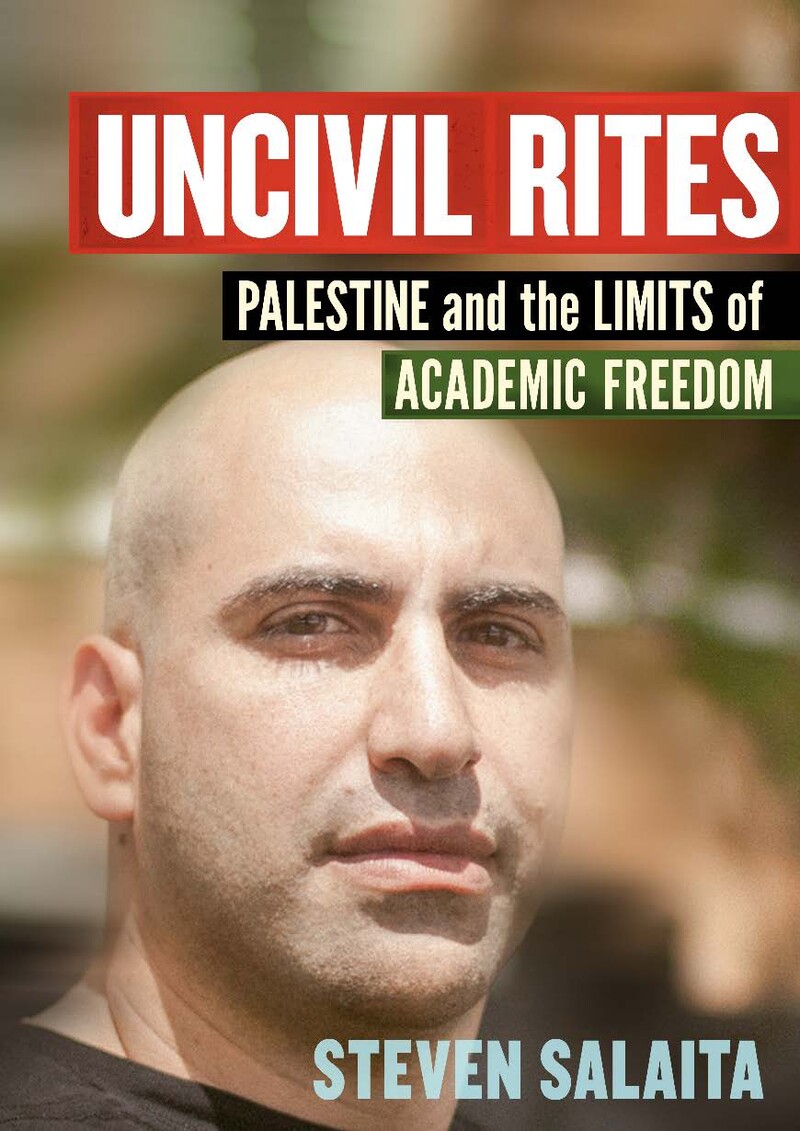
Uncivil Rites: Palestine and the Limits of Academic Freedom by Steven Salaita (Haymarket Books)
Read one way, Steven Salaita’s new book is about lies and children.
There are the persistent lies about Israel’s continued attacks on Palestinians, and in particular its lies about how it kills children.
There are, for instance, the four children killed by Israeli shelling in the summer of 2014 while playing on the beach in Gaza.
In an interview recounted by Salaita, CNN’s Wolf Blitzer asked Naftali Bennett, an Israeli government minister who has boasted about his own killing of Arabs, about the incident.
Bennett fired back, “I think it’s terrible that Hamas is butchering its own children … conducting massive self-genocide. They’re taking women and children, placing them in missile launchers, and shooting the missiles at Israel.”
The outburst puzzled even Blitzer, who is not exactly known for his support of Palestinian rights.
There is the lie Salaita finds himself telling his toddler son.
The moment he received the now infamous email from Phyllis Wise, then chancellor of the University of Illinois at Urbana-Champaign, firing him from his new position as tenured professor in the American Indian Studies program, Salaita sat at his computer and covered his face with both hands.
His son, noticing his father’s pain, came over and asked, “Okay, Papa?” Salaita responded, “Yes, my love, Papa’s okay.”
As any adult even slightly familiar with Salaita’s story and even those who vehemently disagree with him will have to affirm, Salaita and his family were in fact not okay.
Over the next few months, Salaita, his wife and son would spiral into a period of psychological and economic uncertainty, left without incomes and insurance for a while, compelled to move in with his parents because they had already rented out their house in order to move to Champaign-Urbana, and forced to depend on the kindness and support of kin, friends and supporters everywhere.
Uncivil Rites successfully unpacks a complex amalgamation of political, cultural and institutional factors in order to provide the necessary background to Salaita’s case. The chapters here are of varying length, some as brief as a page, and they move skilfully between different registers, exemplifying the vast range of effects, including the personal and the political, that the firing has had on multiple fronts.
As Salaita puts it at the very beginning, “This book is partly about me, but only as I have been actualized by various communities.”
Uncivil Rights performs two necessary functions: it exposes the machinations of the contemporary neoliberal university and it demonstrates that what happened to Salaita had everything to do with the ways in which the neoliberal university is implicated in Zionist attacks on Palestine.
Over the last year, there has been widespread condemnation of the Salaita firing by thousands of academics and several academic organizations.
Thanks in no small part due to the intensive and steady reporting done by The Electronic Intifada, independent attorney Andrew Scheinman and others, several damning facts about what went on behind the scenes and prior to the firing have come to light, among them that Wise attempted to destroy crucial evidence.
In August, US District Judge Harry D. Leinenweber, a Reagan appointee, ruled that Salaita’s breach of contract lawsuit against university trustees and administrators could go to trial.
One of the persistent claims of Salaita’s opponents has been that there was no breach of contract because he supposedly had not yet been formally hired since the board of trustees had not yet signed off on his appointment.
Leinenweber summarily rejected that claim: “If the court accepted the university’s argument, the entire American academic hiring process as it now operates would cease to exist, because no professor would resign a tenure [sic] position, move states and start teaching at a new college based on an ‘offer’ that was absolutely meaningless until after the semester already started.”
Entanglements
In light of the fact that Salaita was fired for the nature of his “uncivil” tweets about Israel, it would be easy to focus on his as a case simply of the violation of academic freedom. But Salaita is careful to point out that the neoliberal university has never been a bastion of open, democratic and accessible education for all, and that the concept of academic freedom itself needs to be contested:
“We ought to complicate academic freedom even as we vigorously defend it. For example, contingent faculty have no functional academic freedom. Administrators can punish their speech through the tactic of contract nonrenewal. It’s not just finances that compel administrators to rely more heavily on untenured labor. It’s a mechanism of plutocratic control, ensuring a power balance that strongly favors the administration. The government has long relied on the private workplace to stifle speech rights; whereas one (hypothetically) cannot be imprisoned for speech, one can be fired by private employers for it. It’s a further entanglement of state and corporation. And a further entanglement of corporation and university.”
That “entanglement” of corporate, political and university interests is a key feature of the neoliberal university. Another is that tremendous power is vested in a small group, the trustees, people who, in general, otherwise understand absolutely nothing about the very institutions that grant them prestige through their affiliation as trustees. The lone holdout who defended Salaita at the September 2014 trustees meeting that formally rejected his appointment was James Montgomery, who spoke of the overt racism he and other Black students faced at the Urbana-Champaign campus in the 1950s.
Indeed, Montgomery noted that their protests against segregated housing might well have been described as “uncivil.”
No one exemplifies the problems of such entanglements and the effects of having ignorant trustees better than Christopher Kennedy, scion of those Kennedys, with their massive wealth and political influence. Kennedy was the board of trustees chair who led the charge against Salaita.
Immediately following Salaita’s firing, only two weeks before he was to start teaching courses scheduled months prior, the Urbana-Champaign News-Gazette reported Kennedy saying that the university had “held off commenting because officials didn’t want to put out a statement that would make it more difficult to reach a statement with Salaita.” If Salaita couldn’t find another job, that might “make him push harder to come,” Kennedy said.
Kennedy’s statement demonstrated that he was either lying or ignorant – it is impossible to get a tenured position in a few weeks when searches can take more than a year.
Last August, The Electronic Intifada uncovered the fact that the senior US senator from Illinois, Democrat Dick Durbin, had emailed Chancellor Wise, expressing his support over the Salaita firing and noting that Kennedy was “solidly in [her] corner.”
All of this makes clear what English department chair and Holocaust studies expert Michael Rothberg wrote in a column for Inside Higher Ed, that “There is enough at stake in the Salaita case by itself, but as a point of condensation for multiple conflicts it is also a kind of mirror that reveals a larger political landscape.”
In Uncivil Rites, Salaita argues convincingly that his case would not be what it is if it had not been for his tweets about Israel and Palestine. The issue at hand was not his “uncivil” discourse, but the position he took.
As to the nature of those tweets, Salaita points out: “I didn’t articulate anti-Semitism. I disparaged Judeo-supremacy.” But the place of Palestine in American political and cultural discourse is such that no distinction is permitted between the two. Palestine, Salaita contends, has a particular place in the American imaginary; it “informs the groundwork of the American project.” Even though the involvement of the United States with it is relatively recent, Palestine is “the progenitor of Manifest Destiny.” And the place of Palestine influences the ways in which Israel and Palestine play a role on American campuses.
Universities, like the United States itself, are built on land wrested from original inhabitants through genocide and capitalist displacement. In contemporary times, they exist within a complicated network of funding apparatuses that make easy distinctions between public and private fuzzy at best.
The University of Illinois at Urbana-Champaign is one of many public “land grant” institutions that were established from the proceeds of the sale of public land given by the federal government.
But private universities also depend on huge public subsidies in the form of tax exemptions, federal grants and contracts and financial aid to subsidize tuition.
Which is to say, displacement and a settler-colonial mentality are endemic to the contemporary university - a reality underscored by the long attachment of the University of Illinois and other institutions to Indian mascots, racialized and romanticized representations of the people who were exterminated or displaced.
In this context, the call to “civility” and the claim that Salaita, a Christian Palestinian American with roots in Appalachia, had failed to pay attention to it, is rooted in an American and Israeli racist conception of Palestinians as a people in permanent need of discipline, as if they were animals.
As Salaita observes, “There is a terrible irony in using ‘uncivil’ to describe supporters of Palestine (or any other site of decolonization): the accusation locates the recipient in the wretchedness of sub-humanity, but implicates the speaker in centuries of colonization and genocide.”
Cracks in the foundation
Uncivil Rites is a necessary book about a watershed moment that reveals the cracks in the foundation of the neoliberal university. Salaita eschews the easier strategy of locating all this in academic freedom and takes pains, in a text filled with wit and sarcastic asides, to document the implications of Palestine and Israel and the sheer brutality of Zionism not only on the beaches of Gaza but in the corridors of academic and political power.
Given all that, it would be useful for future editions to include a basic timeline. A book published by Haymarket, a storied leftist press, inevitably expects its readers to come to this subject with some prior knowledge, but even I, who have been following the case, wanted a brief history before I plunged into an otherwise excellent book.
On occasion, Salaita references the “right-wing operatives” who criticized him and demanded his firing. But it is worth remembering that many of his most toxic critics, like retired English professor and Israel lobby activist Cary Nelson, are hardly notorious right-wingers.
Indeed, Christopher Kennedy himself is visibly identified as a moderately progressive Democrat. It is easy to render opponents of Palestine as only right-wing fanatics, but that allows us to forget, at great cost, that it’s the progressive left that harbors a great deal of the anger and hostility.
As a result of his firing, Steven Salaita and his family have suffered enormous hardships. One way to read all this is to focus on how awful it is that a man with a family should have to bear so much.
But another and more productive way is to do what Salaita does with such skill: connect the suddenness of that displacement and the wrenching effects it had on one family with the ways that Zionism itself goes about displacing, killing and maiming thousands every year.
Yasmin Nair is a writer, academic, and activist in Chicago. She’s a co-founder of the radical queer editorial collective Against Equality and the Volunteer Policy Director of Gender JUST. Her work has appeared in publications including In These Times, The Daily Dot and Maximum Rock’n’Roll. She is currently working on a book titled Strange Love: Neoliberalism, Affect and the Invention of Social Justice. Nair’s writings can be found at yasminnair.net.
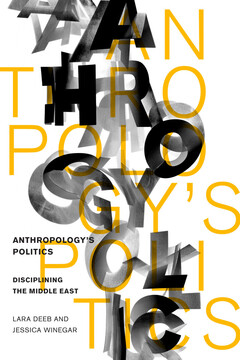
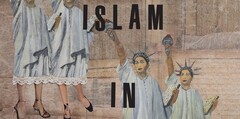

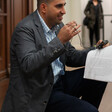
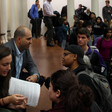
Comments
Uncivil Rites
Permalink tom hall replied on
An excellent review of a timely and important book. Further updates on Steven Salaita's suit against the University will be most welcome- the outcome will influence politics on and off campus for years to come.
A miserable event...
Permalink Amer Hudson replied on
What happened to Salaita was a miserable and spiteful example of the day-to-day cruelty of Zionism and its supporters.
The more this sort of conduct is exposed, the more light we shine on these creatures of the night.
Agreeing with Amer Hudson on Prof. Salaita
Permalink Tess replied on
Exactly!
Manifest Destiny?
Permalink Eric replied on
I'm surprised by the quotation, apparently from the book, that "Even though the involvement of the United States with it is relatively recent, Palestine is 'the progenitor of Manifest Destiny.'”
Manifest Destiny dates from 1845 and refers to the imperial assumption that the United States should rule North Americas, or perhaps the Americas Hemisphere. It's hard to see any "progenitor" link from Palestine.
Excellent review
Permalink Anonymous replied on
I am sure Salaita will come stronger and with deeper knowledge from this case. All in all, he lost a job. No one wants that of course. But in context of peoples who were systematically murdered, like the Indian-Americans, or their societies destroyed, like the Palestinians, his sacrifice is moderate. Nonetheless, good job Electronic Intifada for publicizing and giving this issue the coverage it deserves.
It just goes to show that
Permalink Tess replied on
It just goes to show that wherever in the world they are the Zionists will attempt to destroy Palestinians in any way possible. Had Prof. Salaita been in Israel he would have been executed by the IDF.